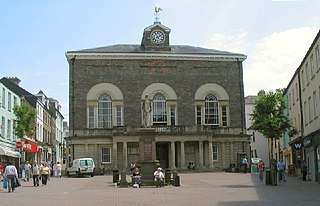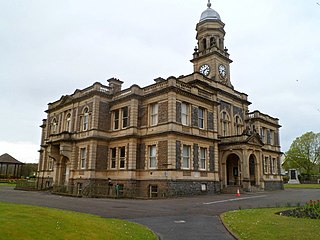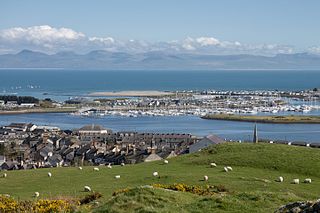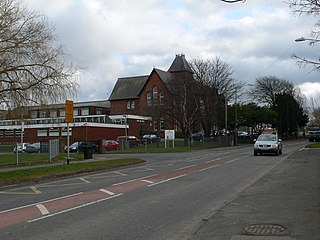
Carmarthenshire is a county in the south-west of Wales. The three largest towns are Llanelli, Carmarthen and Ammanford. Carmarthen is the county town and administrative centre. The county is known as the "Garden of Wales" and is also home to the National Botanic Garden of Wales.

Llanelli is a market town and community in Carmarthenshire and the preserved county of Dyfed, Wales. It is located on the Loughor estuary and is also the largest town in the county of Carmarthenshire.

Pwllheli is a market town and community on the Llŷn Peninsula, in Gwynedd, north-west Wales. It had a population of 4,076 in 2011, which declined slightly to 3,947 in 2021; a large proportion (81%) were Welsh speaking. Pwllheli is the place where Plaid Cymru was founded. It is the birthplace of the Welsh poet Sir Albert Evans-Jones.

Burry Port is a port town and community in Carmarthenshire, Wales, on the Loughor estuary, to the west of Llanelli and south-east of Kidwelly. Its population was recorded at 5,680 in the 2001 census and 6,156 in the 2011 census, and estimated at 5,998 in 2019. The town has a harbour. It is also where Amelia Earhart landed as the first woman to fly across the Atlantic Ocean. Nearby are the Pembrey Burrows sand dune and wetland system, forming a country park, and the Cefn Sidan sands. Its musical heritage includes Burry Port Opera, Male Choir and Burry Port Town Band.

Llandovery is a market town and community in Carmarthenshire, Wales. It lies on the River Tywi and at the junction of the A40 and A483 roads, about 25 miles (40 km) north-east of Carmarthen, 27 miles (43 km) north of Swansea and 21 miles (34 km) west of Brecon.
Pembrey Burrows stretch from Burry Port's harbour area – a former coal port, now a marina – to Pembrey Country Park, a leisure and nature complex that is one of West Wales's leading visitor attractions.

Trelech is a village in the parish of Tre-lech a'r Betws, Carmarthenshire, in south-west Wales. It is also the name of the community. Trelech is located some 10 miles north-west of Carmarthen and 6.5 miles south of Newcastle Emlyn.

The West Wales lines are a group of railway lines from Swansea through Carmarthenshire to Pembrokeshire, West Wales. The main part runs from Swansea to Carmarthen and Whitland, where it becomes three branches to Fishguard, Milford Haven and Pembroke Dock.

Rhosneigr is a village in the south-west of Anglesey, north Wales. It is situated on the A4080 road. It is south-east of Holyhead, and is on the Anglesey Coastal Path. From the clock at the centre of the village can be seen RAF Valley and Mynydd Twr. The towns of Holyhead and Llangefni and the city of Bangor are all within easy travelling distance.

Pontyberem is a village and community situated in the Gwendraeth Valley halfway between Carmarthen and Llanelli in Carmarthenshire, Wales. As of the 2001 Census, the population was recorded as 2,829, reducing to 2,768 at the 2011 Census.

Gwaun-Cae-Gurwen is a village and community in Neath Port Talbot, South West Wales. Historically a part of Glamorgan, Gwaun-Cae-Gurwen is a parish made up of the electoral wards of Gwaun-Cae-Gurwen and Lower Brynamman.
Cefneithin is a village and community in Carmarthenshire, Wales, in the Carmarthenshire coalfield area. It lies just off the A48 road, 7 miles north west of Ammanford and 9 miles north of Llanelli. Its nearby community villages include Cross Hands, Drefach, Cwmmawr, Foelgastell and Gorslas. The Gwendraeth Fawr river flows nearby and its source is at Llyn Llech Owain, just north of the village. Cefneithin has a chapel (Tabernacl), a village hall, a primary school, and a secondary school. The latter, Ysgol Maes y Gwendraeth, was re-opened in 2016 after an extensive renovation and an £18.4m investment; it has 1,000 pupils, of which 157 in sixth form, and resources for children with additional learning needs. Prior to 2016 when the school was called Ysgol Gyfun Maes Yr Yrfa, some of its famous pupils include Nigel Owens, Jonathan Edwards, TV presenter Alex Jones and British and Irish Lion rugby player, Dwayne Peel.

Ysgol Glan Clwyd is a Welsh medium secondary school, and was the first of its kind. It opened in 1956, initially at Rhyl on the coast before moving inland to St Asaph in 1969. It is overseen by the Denbighshire Local Education Authority.

Ysgol Glan y Môr is a bilingual comprehensive school in the market town of Pwllheli in the Welsh county of Gwynedd. The school serves a large part of the Llŷn Peninsula. As of 2023, there were 472 pupils on roll at the school. According to the latest Estyn inspection report in 2017, approximately three-quarters of pupils come from Welsh-speaking homes.

Ysgol Gymraeg Pwll Coch is a large Welsh-medium primary school in the Canton area of western Cardiff, in Wales.
Crown Park Suburbs are a Welsh football club from Llanelli in Carmarthenshire. They have played in the Welsh Football League reaching the top flight, Division One. They last played in the Carmarthenshire League.
The bedrock geology of Carmarthenshire in west Wales consists largely of Palaeozoic age sedimentary rocks. Unconsolidated deposits of Quaternary age in Carmarthenshire include a dissected cover of glacial till, valley floor alluvium and some scattered peat deposits in both upland and lowland settings. There are extensive beach and tidal flat deposits along the Carmarthenshire coast. The exploitation of the county's mineral riches, particularly coal and limestone, was a key part of the local economy through much of the nineteenth and twentieth centuries.















